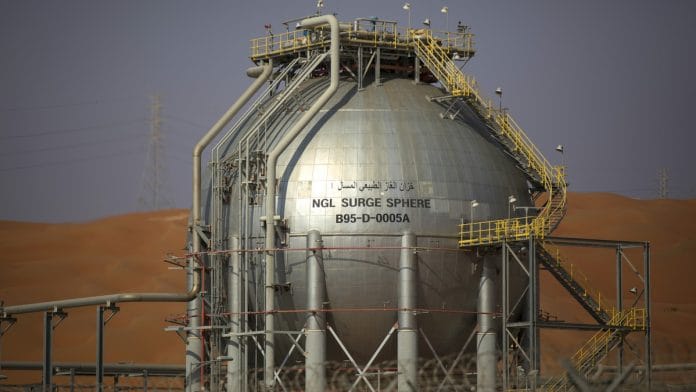The real impact of the attack on Saudi oil installations last weekend goes well beyond the temporary loss of 5 per cent of global oil production: It strikes at the heart of the mechanism that’s guaranteed the security of the world’s crude supply for most of the past 50 years.
Ever since the western oil majors lost control of output in the Middle East, Saudi Arabia’s willingness to maintain idle production capacity has been the world’s safety valve to offset its dependence on the volatile region. When there was conflict and blockages elsewhere, Riyadh could always turn on the taps and serve the international market. But its new vulnerability requires a complete rethink of how we view and perhaps pay for the future security of supplies.
Some 25 pilotless aircraft and cruise missiles of Iranian origin were used to strike the two sites, the Saudi Defense Ministry said at a press briefing four days after the attacks. The extent of Iran’s involvement remains unclear. It may have taken a direct role or it may have supplied the Houthi rebels in Yemen with hardware. That second possibility is almost more troubling because it puts the power to wreak havoc into the hands of anybody able to fly a drone.
If the attack was indeed launched from Iran, that raises very serious questions about the ability of Saudi Arabia’s expensive air defense systems (or the people using them) to defend the most important oil installation on the planet. The failure to detect 25 incoming threats travelling 280 miles from the direction of your sworn enemy would be a major failure. Missing them from an unexpected direction would be easier to understand, although no less devastating.
The damage to infrastructure will be repaired. The Khurais field resumed 30% of its output within 24 hours, pumping about 360,000 barrels a day, and the Abqaiq plant was processing 2 million barrels a day by Tuesday, down from 4.5 million before the strikes. The kingdom’s production capacity will be restored to 11 million barrels a day by the end of the month and in full by the end of November, according to the new energy minister Abdulaziz bin Salman. Some independent analysts see it taking longer. Energy consultants FGE said the Saudi plans were optimistic, while Rystad Energy said repairs at Abqaiq may only be completed “as we approach the end of the year.”
The disruption will be offset initially by increased production from Saudi fields that don’t rely on Abqaiq or Khurais for processing, by drawing on the kingdom’s own reserves at home and overseas, and through increased production from other countries. Emergency stockpiles in oil-consuming countries may be tapped if necessary, although the International Energy Agency doesn’t believe they will be needed.
But Saudi Arabia’s 12 million barrels a day of maximum sustainable capacity has just lost its effectiveness as the world’s hydrocarbon security blanket.
Strategic stockpiles held by oil-consuming countries have only ever been a sticking plaster, designed to get us through a short supply interruption while Saudi Arabia boosts output. But last Saturday’s attack has, at a stroke, taken out much of that spare capacity along with current supplies.
What the world needs now is an outbreak of peace, or at least “live and let live,” in the Middle East. Unfortunately that seems as unlikely as ever. Demonizing Iran or any other country won’t reduce tensions even if it’s a natural reaction to the strikes.
In the absence of political calm, clearly there needs to be an extensive upgrade to the protection of key assets — although that might not thwart a repeat attack.
Holding all of the world’s spare production capacity in one place has always been a risk. A broader system of allocating and paying for an output buffer across different geographies may be desirable, even for the U.S., which remains a net importer of oil. With international institutions losing their luster, however, I don’t hold out much hope. – Bloomberg
Also read: Saudi oil shock is a reminder — we need to switch to non-oil power sources quickly







Ground realities of political environment of west bengal has been elaborately explained in this write up. Mamta being a formidable Street fighter understands ground swelling for BJP very well but so far whatever steps she took to negate this effect actually went in favor of BJP narrative. Her antipathy towards jayshree ram slogan boomeranged on her. Her unhindered support to muslims/imams disillusioned bhadra bengali manush. Matua folks walked away from her. No action against Syndicate for their emboldened criminal activities forced public to look for alternative options available and leaned on to BJP. Intolerance about democratic values of opposition and deteriorating law & order situations decimated Mamta’s image as a strong leader. Instead of sharing power with Mukul Roy, she blundered by ascending Abhishek Banerjee at the cost of Mukul Roy, the master strategist who enforced crumbling of left citadel. Cumulative impact of all these factors resulted in BJP winning 18 seats.
Now wind of change favors BJP who needs to keep up momentum in its favor and put all pressures to expose TMC government.
WB is looking for another change but one must keep in mind, street fighting capabilities of Mamta.
Time till assembly elections is very interesting, but huge violence for area domination will be a regular feature.
Let us see if PK can change fortunes of TMC.